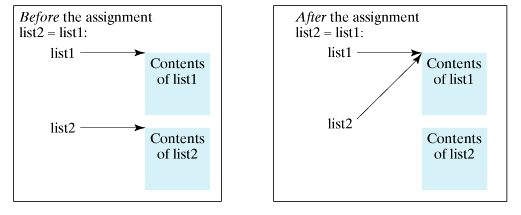Java Array Summary
Array Basics
Declaring Array Variables
dataType[] arrayRefVar; //Preferedor
dataType arrayRefVar[];Examples:
double[] myList;//Preferedor
double myList[];Creating Arrays
arrayRefVar = new dataType[arraySize];Declaring, Creating, Assigning:
dataType[] arrayRefVar = new dataType[arraySize];or
dataType arrayRefVar[] = new dataType[arraySize];Example:
double[] myList = new doublep[10];Array Size and Default Values
When space for an array is allocated , the array size must be given. When an array is created, its elements are assigned the default value of 0 for the numeric primitive data types, ‘\u0000’ for char types, and false for boolean types.
Array Initializers
dataType[] arrayRefVar = {value0, value1, ... , valuek};For example,
double[] myList = {1.9, 2.9, 3.4, 3.5};This statement declares, creates, and initializes the array myList with four elements, which is equivalent to the statements shown below:
double[] myList = new double[4];
myList[0] = 1.9;
myList[1] = 2.9;
myList[2] = 3.4;
myList[3] = 3.5;Caution:
The new operator is not used in the array initializer syntax.Using an array initializer, you have to declare, create, and initialize the array all in one statement. Splitting it would cause a syntax error. Thus the next statement is wrong:
double[] myList;
myList = {1.9, 2.9, 3.4, 3.5};Processing Arrays
Cautions:
For an array of the char[] type, it can be printed using one print statement. For example, the following code displays Dallas:
char[] city = {'D', 'a', 'l', 'l', 'a', 's'};
System.out.println(city);Example: (Finding the smallest index of the largest element)
double max = myList[0];
int indexOfMax = 0;
for (int i = 1; i < myList.length; i++) {
if (myList[i] > max) {
max = myList[i];
indexOfMax = i;
}
}foreach Loops
Example:
for (double element: myList) {
System.out.println(element);
}Copy Arrays
list2 = list1;This statement does not copy the contents of the array referenced by list1 to list2, but merely copies the reference value from list1 to list2.

In Java, you can use assignment statements to copy primitive data type variables, but not arrays. Assigning one array variable to another array variable actually copies one reference to another and makes both variables point to the same memory location.
There are three ways to copy arrays:
Use a loop to copy individual elements one by one.
Use the static
arraycopymethod in theSystemclass.Use the
clonemethod to copy arrays.
Loop:
int[] sourceArray = {2, 3, 1, 5, 10};
int[] targetArray = new int[sourceArray.length];
for (int i = 0; i < sourceArray.length; i++) {
targetArray[i] = sourceArray[i];
}arraycopy:
arraycopy(sourceArray, srcPos, targetArray, tarPos, length);The parameters srcPos and tarPos indicate the starting positions in sourceArray and targetArray, respectively. The number of elements copied from sourceArray to targetArray is indicated by length. For example, you can rewrite the loop using the following statement:
System.arraycopy(sourceArray, 0, targetArray, 0, sourceArray.length);The arraycopy method does not allocate memory space for the target array. The target array must have already been created with its memory space allocated. After the copying takes place, targetArray and sourceArray have the same content but independent memory locations.
Passing Arrays to Methods
public static void printArray(int[] array) {
for (int i = 0; i < array.length; i++) {
System.out.print(array[i] + " ");
}
}You can invoke it by passing an array. For example, the following statement invokes the printArray method to display 3, 1, 2, 6, 4, and 2:
printArray(new int[]{3, 1, 2, 6, 4, 2});new dataType[]{value0, value1, ..., valuek};There is no explicit reference variable for the array. Such an array is called an anonymous array.
Java uses pass-by-value to pass arguments to a method. There are important differences between passing the values of variables of primitive data types and passing arrays.
For an argument of a primitive type, the argument’s value is passed.
For an argument of an array type, the value of the argument contains a reference to an array; this reference is passed to the method.





















 9177
9177











 被折叠的 条评论
为什么被折叠?
被折叠的 条评论
为什么被折叠?








